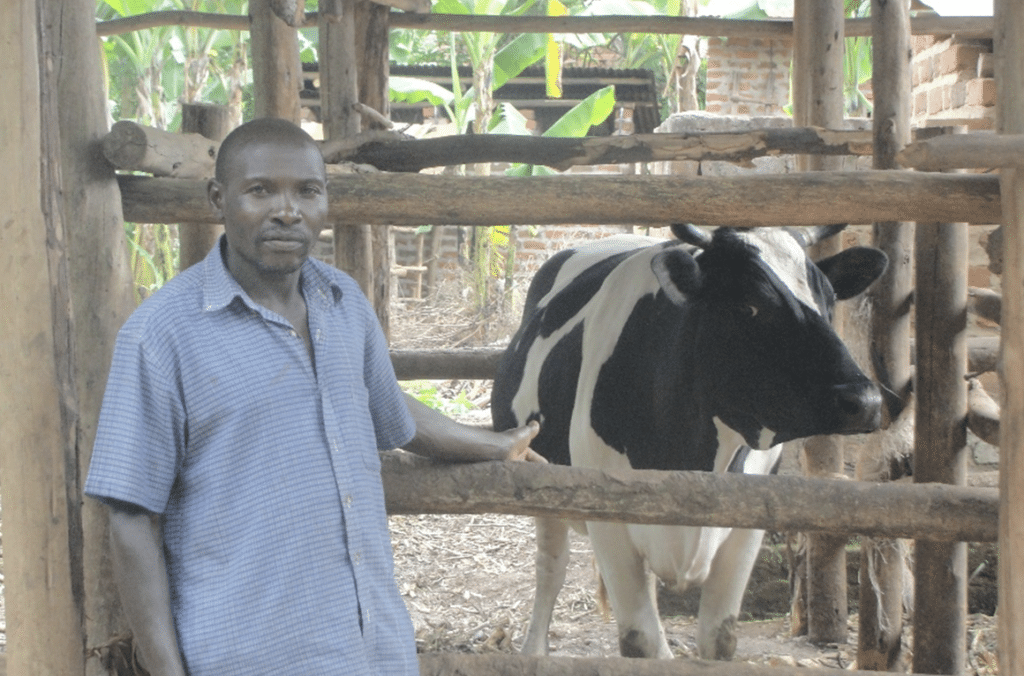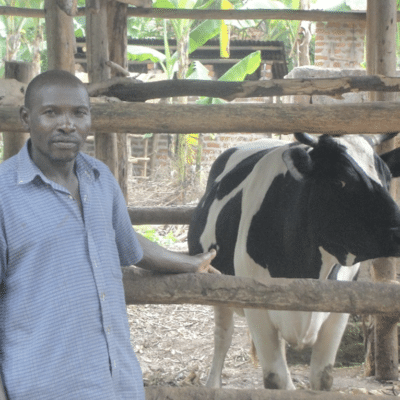In the rural village of Lubanda, in Uganda’s Lwengo district, lives 55-year-old Erisa Ssenyondo, a father of 14 children. Like many parents, Erisa works tirelessly to meet the needs of his large family—providing food, education, medical care, and a home. Yet, the challenges of raising such a large family can often feel insurmountable. However, thanks to the Microfinancing Partners in Africa’s (MPA) Cow Program, Erisa’s life has been transformed in ways he never imagined.
Joining the MPA Cow Program
Erisa became part of the Cow Program in 2016 through the MADDO (Masaka Diocese Development Organization) project. After receiving comprehensive training in cow management, Erisa was gifted a cow from another farmer as part of the “pass-on” system. The cow’s first of many calves arrived soon after, and over the years, it has produced six calves—three bulls and three heifers—each playing a pivotal role in Erisa’s growing livelihood.
The Cow: A Lifeline for Erisa’s Family
For Erisa, the cow has been nothing short of a lifeline.
“With this big family, I do not think I would be able to provide even half of their needs had it not been for the cow. Life would really be so hard,” he says.
The cow’s milk, which Erisa sells locally, provides a steady source of income. He is able to save about 60,000 UGX each month from milk sales alone. Beyond milk, the cow’s manure has enriched the soil, boosting the yields from Erisa’s coffee farm. This has had a direct impact on the family’s financial situation, allowing them to invest in their future.
Improved Education and Standards of Living
Before joining the Cow Program, Erisa struggled with food insecurity, and his children attended Universal Primary Education (UPE) schools due to financial limitations. Today, things have changed dramatically. Erisa is proud to say that none of his children are in UPE schools anymore. All of them now attend good private schools in town, a major achievement made possible by the extra income generated from the cow.
For the past seven years, Erisa’s family has been food-secure. They no longer face the struggles of hunger that once weighed heavily on them. With the profits from the milk sales, Erisa was also able to purchase three acres of land, a 3,000-liter water tank for rainwater harvesting, and even a motorcycle to improve mobility for the family.

Building a Brighter Future
Erisa’s vision for the future is clear:
“I am aiming at buying another heifer and want to build a farm with at least five cows. This will ensure enough manure for my banana and coffee plantations, leading to increased yields and income,” he shares enthusiastically.
His commitment to improving his family’s circumstances and expanding his farming operations is evident in his actions. He has already saved enough money to purchase another cow, which will allow him to further increase his income, expand his land, and increase his family’s quality of life.
Gratitude for the MPA Cow Program
Erisa’s gratitude for the Microfinancing Partners in Africa’s Cow Program is immeasurable. He thanks the Diocese of Masaka, the funders, and the staff at MADDO for their unwavering support.
“On behalf of my family, we cannot thank enough the Diocese of Masaka, the funders, and MADDO Dairies for uplifting the standards of living in our community. Long live Masaka Diocese, the funders, MADDO Dairies, and the cow project!”
Conclusion
Erisa Ssenyondo’s story is a shining example of how small interventions can create lasting, positive change. Through the Cow Program supported by Microfinancing Partners in Africa, Erisa has transformed his life, providing for his family, improving his farming practices, and ensuring that his children receive a quality education.
The Cow Program demonstrates the power of sustainable agriculture in uplifting rural families and communities. For Erisa, the future is now filled with promise and opportunity, all thanks to the transformative impact of a single cow and the support of the MPA community.
Let’s continue to support life-changing initiatives like the MPA Cow Program, which empowers families, fosters self-reliance, and creates lasting change.

